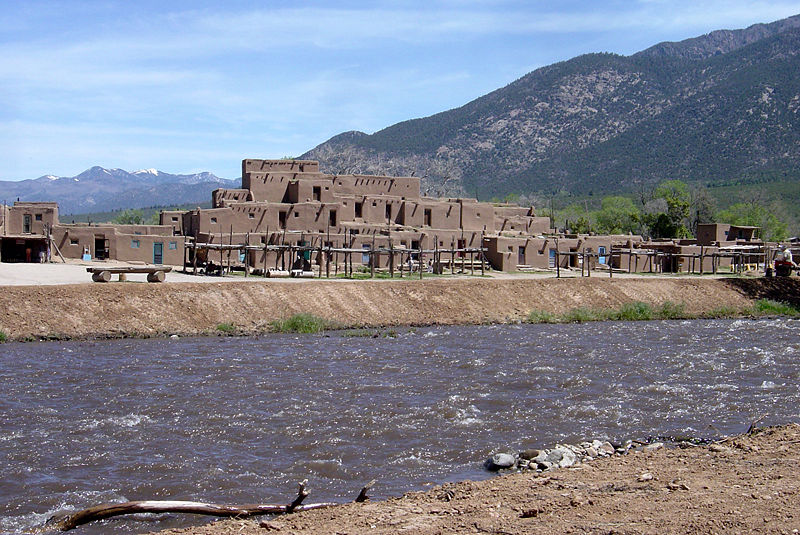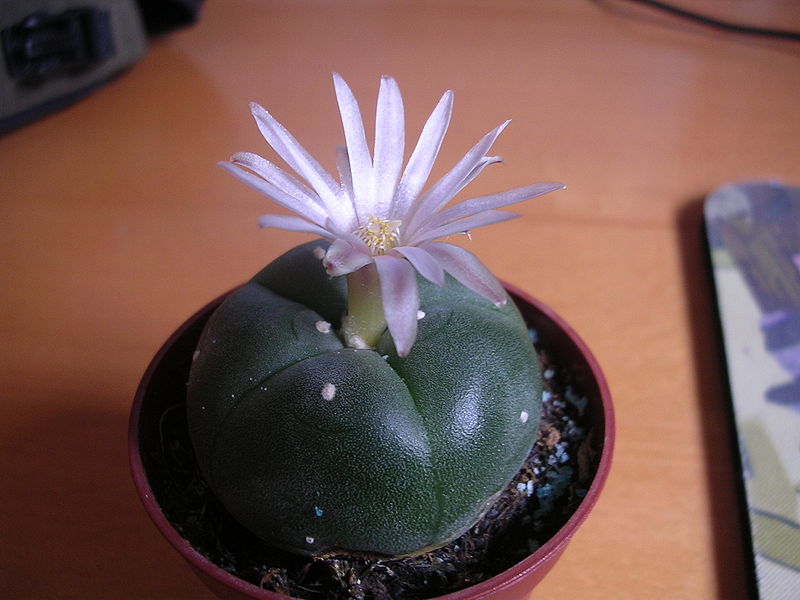
Taos Pueblo, New Mexico, with its sacred Blue Lake in the mountains
The American Indian Religious Freedom Act 1978
The American Indian Religious Freedom Act (commonly abbreviated to AIRFA) is a US federal law and a joint resolution of Congress that was passed in 1978. It was created to protect and preserve the traditional religious rights and cultural practices of American Indians, Eskimos, Aleuts and Native Hawaiians. These rights include, but are not limited to, access of sacred sites, repatriation of sacred objects held in museums, freedom to worship through ceremonial and traditional rites, including within prisons, and use and possession of objects considered sacred. The Act required policies of all governmental agencies to eliminate interference with the free exercise of Native religion, based on the First Amendment, and to accommodate access to and use of religious sites to the extent that the use is practicable and is not inconsistent with an agency's essential functions. It also acknowledged the prior violation of that right.
 |
|
Taos Pueblo, New Mexico, with its sacred Blue Lake in the mountains |
 |
|
Sacred Eagle Bone Whistle |
 |
|
Flowering Peyote |
Public Law 95-341 95th Congress Joint Resolution American Indian Religious Freedom.
Whereas the freedom of religion for all people is an inherent right, fundamental to the democratic structure of the United States and is guaranteed by the First Amendment of the United States Constitution; Whereas the United States has traditionally rejected the concept of a government denying individuals the right to practice their religion, and as a result, has benefited from a rich variety of religious heritages in this country; Whereas the religious practices of the American Indian (as well as Native Alaskan and Hawaiian) are an integral part of their culture, tradition, and heritage, such practices forming the basis of Indian identity and value systems; Whereas the traditional American Indian religions as an integral part of Indian life, are indispensable and irreplaceable; Whereas the lack of a clear, comprehensive, and consistent Federal policy has often resulted in the abridgment of religious freedom for traditional American Indians; Whereas such religious infringements result from the lack of knowledge of the insensitive and inflexible enforcement of Federal policies and regulations premised on a variety of laws; Whereas such laws were designed for such worthwhile purposes as conservation and preservation of natural species and resources but were never intended to relate to Indian religious practices and, there, were passed without consideration of their effect on traditional American Indian religions; Whereas such laws and policies often deny American Indians access to sacred sites required in their religions, including cemeteries; Whereas such laws at times prohibit the use and possession of sacred objects necessary to the exercise of religious rites and ceremonies; Whereas traditional American Indian ceremonies have been intruded upon, interfered with, and in a few instances banned; Now, therefore, be it Resolved by the Senate and the House of Representatives of the United States of American in Congress Assembled, That henceforth it shall be the policy of the United States to protect and preserve for American Indians their inherent right of freedom to believe, express, and exercise the traditional religions of the American Indian, Eskimo, Aleut, and Native Hawaiians, including but not limited to access to sites, use and possession of sacred objects, and the freedom to worship through ceremonials and traditional rites.
SEC. 2. The President shall direct that various Federal departments, agencies, and other instrumentalities responsible for the administering relevant laws to evaluate their policies and procedures in consultation with Native traditional religious leaders in order to determine appropriate changes necessary to protect and preserve Native American religious cultural rights and practices. Twelve months after approval of this resolution, the President shall report back to Congress the results of his evaluation, including any changes which were made in administrative policies and procedures, and any recommendations he may have for legislative action.
Approved August 11, 1978
The major criticism of the American Indian Religious Freedom Act was its inability to enforce its provisions, therefore its inability to provide religious freedom without condition. The act served as more of a joint resolution than an actual law. Its failure to protect certain sacred sites proved detrimental to Native American culture and religion as a whole. The 1988 Lyng v. Northwest Indian Cemetery Association decision represented a unique convergence of religion, law, and land, and confirmed the American Indian Religious Freedom Act as a hollow excess of words
Due to the criticism of the AIRFA and its inability to enforce the provisions it outlined in 1978. On June 10, 1994 the House of Representatives, Committee on Natural resources and Subcommittee on Native American Affairs met to bring about H.R. 4155 in order to provide for the management of federal lands in a way that doesn't frustrate the traditional religions and religious purposes of Native Americans. Also, H.R. 4230 was set forth to amend the American Indian Religious Freedom Act to provide for the traditional use of peyote as sacrament in religious ceremonies.
Also consider the NAGPRA (Native American Graves Protection and Repatriation Act of 1990) and ARPA (Archaeological Resources Protection Act 1979).
source: http://en.wikipedia.org/wiki/American_Indian_Religious_Freedom_Act
return to Contact Schedule